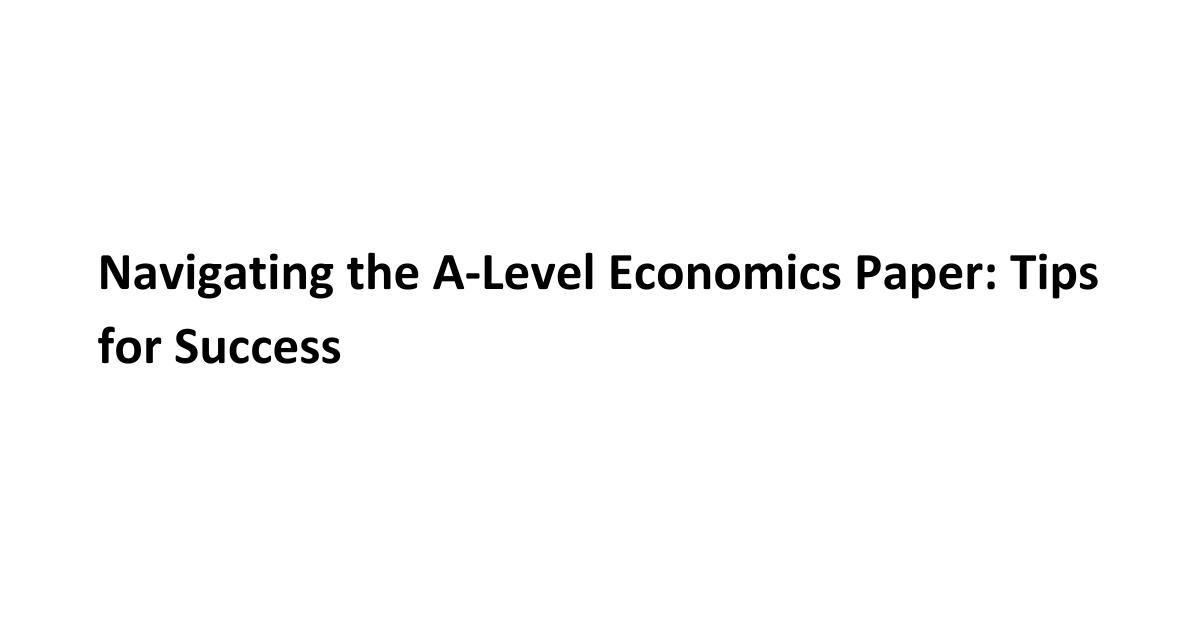
24 Oct Navigating the A-Level Economics Paper: Tips for Success
The A-Level Economics paper can be a challenging and demanding examination for students, with H1 and H2 levels featuring varying components. In H1, students face the Paper 1 Case Studies, while H2 entails both Paper 1 Case Studies and Paper 2 Essays. In this article, we’ll explore tips to help students excel in these examinations and tackle them with confidence.
Understanding the Examination Components
Let’s begin by understanding the structure of the A-Level Economics paper. In H1, the examination consists of the Paper 1 Case Studies. On the other hand, H2 incorporates both Paper 1 Case Studies and Paper 2 Essays.
The Case Studies component in both H1 and H2 involves the presentation of economic data and issues in various formats, including textual, numerical, and graphical representations. Subsequently, students are tasked with answering questions based on these data and issues.
The Essay component, found exclusively in H2, necessitates responses in an essay format. Section A of this component delves into microeconomics, while Section B focuses on macroeconomics. These essay questions often have real-world economic contexts and require students to answer a total of three questions, including one from Section A, one from Section B, and one from either Section A or B.
Tips for Success
- Strengthen Your Economic Foundation: The cornerstone of success in A-Level Economics lies in building a robust foundation in the subject. Consistent revision, practice, and a deep understanding of economic concepts will better prepare you for the examination. A strong foundation equips you to tackle complex questions and apply economic concepts with ease.
- Identify Key Words: Pay careful attention to the key words in each question, as they determine the type of response required. Words like “describe,” “explain,” and “discuss” call for different approaches. Read each question carefully to accurately identify its requirements and tailor your response accordingly.
- Develop Analytical Skills: The ability to analyze data is crucial, particularly for the Case Studies component. Data analysis plays a significant role in supporting your answers. Properly analyzed data can help you identify the relevant economic concepts to apply in your responses. The Essay component also demands analytical skills, especially when questions are linked to real-world issues.
- Consider Different Perspectives: When planning your answers, consider multiple perspectives. This approach ensures that your responses cover all possible viewpoints, resulting in comprehensive answers while applying the relevant economic concepts. Additionally, incorporating multiple perspectives allows you to provide a well-rounded evaluation and make mature judgments.
- Practice Time Management: Efficient time management is key to success. Allocate a specific amount of time to each section or question based on its weight in the examination. This prevents you from spending too much time on a single question and allows you to complete the paper within the allocated time.
- Use Real-World Examples: In your essay responses, incorporating real-world examples can enhance the quality of your answers. Real-world instances demonstrate the practical relevance of economic concepts and showcase your understanding of their applications.
- Review and Seek Feedback: Regularly review your answers and seek feedback from your teacher or tutor. Constructive feedback can help you identify areas for improvement and refine your skills. This process allows you to fine-tune your responses and approach the examination with confidence.
In conclusion, success in the A-Level Economics paper requires a combination of strong foundational knowledge, analytical skills, careful consideration of question requirements, and the ability to view issues from various perspectives. By following these tips and practicing consistently, you can navigate the examination confidently and excel in your A-Level Economics paper.



Sorry, the comment form is closed at this time.